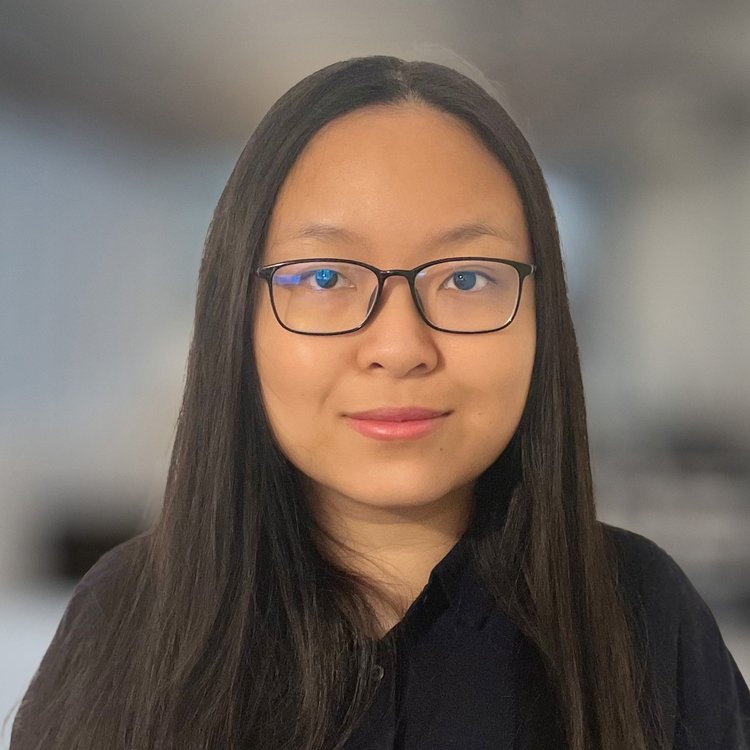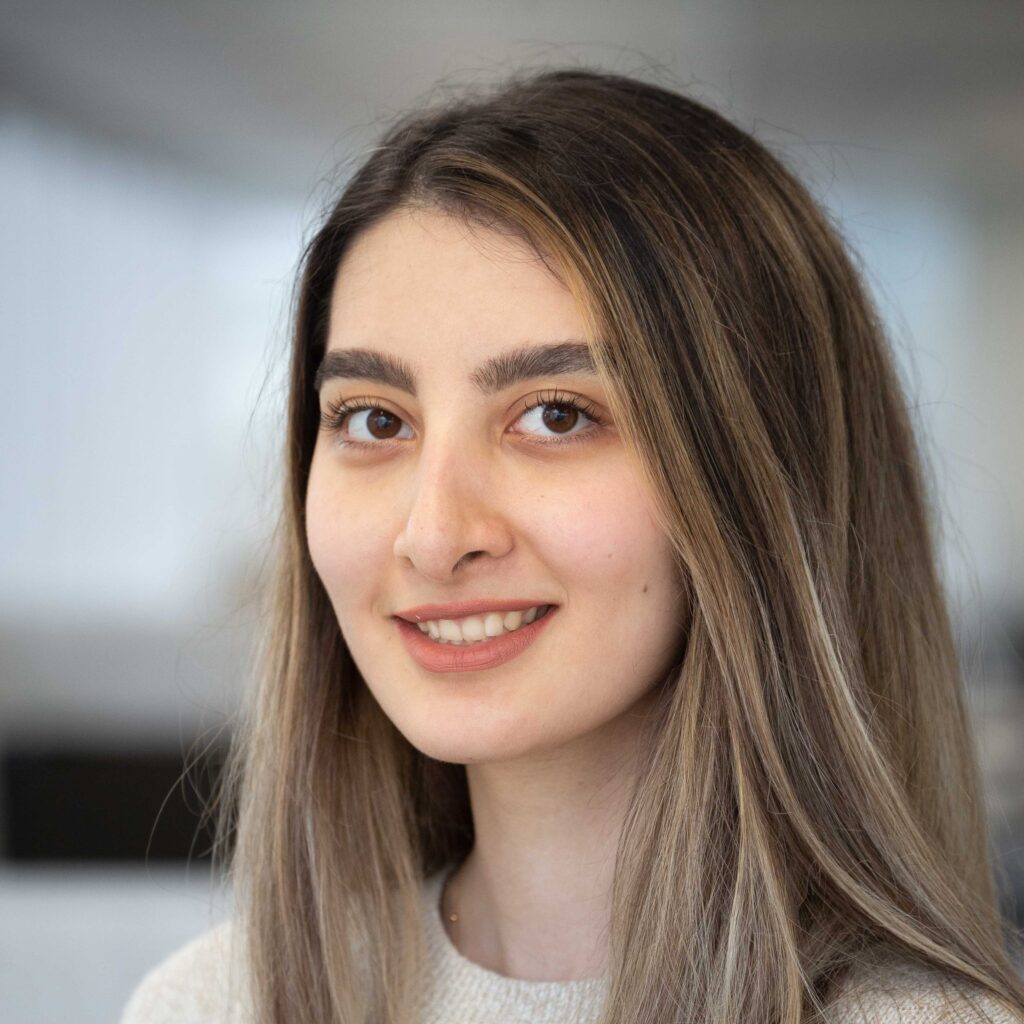Last Friday, 64 MScAC students (2020-21 cohort) celebrated their graduation at an in-person convocation ceremony. We spoke with four of the graduates about their experiences during their time in the program, as well as their passions and motivations for pursuing the Master of Science in Applied Computing.
Helena (Xinming) Ye
-
Undergraduate major:
Mechatronics, Robotics and Automation (McMaster University) -
MScAC internship company: SOTI
-
Current role: Data Science Developer, Big Data and AI (Bell Labs)

Prior to the MScAC, what was your educational background?
I had a BEng in Mechatronics from McMaster University, that included a co-op placement. I wasn’t sure what I wanted to focus on, and the mechatronics degree provided me with the opportunity to learn about a lot of different things, including electrical design, software design, and a little bit of mechanical design. Around my third or fourth year, I realized I really wanted to go into software, and made my decision to go into software engineering or computer science for my graduate studies.
What made you apply to the MScAC program?
The MScAC program was really the perfect program to me. The Department of Computer Science has a great reputation, so academically it would give me the state-of-the-art knowledge in artificial intelligence. The MScAC program also has the internship, so I thought I’d be able to combine the research side with the application side and get a thorough knowledge of AI. I thought this would help me achieve my career goals.
What courses did you take during the program?
I really learned a lot in my courses. I took an Introduction to Machine Learning course, just to give myself some foundations in AI. I also took Imitation Learning for Robotics and Natural Language Computing (NLC). My internship was focused on natural language computing, so I was able to apply what I’d learned in the NLC course and gain a deeper level of understanding.
You worked at SOTI for your internship. How was your MScAC internship different to the co-op placement you had completed during your undergraduate degree?
In my undergraduate co-op placement, the software I’d developed was already very mature. There were tons of solutions to problems online and whenever I was stuck, I could find someone to help. The people I was working with had usually already done whatever I was working on. For my MScAC internship at SOTI, I was working on the newest research advancements there are. The internship required expertise in math and machine learning, as well as a deep understanding of the models I was trying to apply in the actual product.
How do you think the MScAC program will help you achieve your career goals?
The MScAC was definitely very helpful in my transition from the mechatronics field to computer science. I gained expertise in artificial intelligence through the courses, and I had the practical experience of applying the newest technology. That made me quite competitive in AI-related interviews I went to after the program. Additionally, I now know a lot of MScAC alumni, and I can just reach out and connect.
Do you have any advice for aspiring MScAC students?
Be open to change, be open to new things, have fun, and enjoy the experience!
Valentin Villecroze
-
Major prior to joining MScAC: Mathematics and Computer Science (École Polytechnique)
-
MScAC internship company: Layer 6
-
Current role: Machine Learning Scientist, Layer 6

What brought you to Canada and the MScAC program?
I was looking for a program in North America. I wanted to come to Canada, at least once in my life, and I chose Toronto as it’s a large hub for artificial intelligence. It meant I could also practice my English. In terms of the MScAC, I wasn’t sure if I wanted to do research or go into industry after my master’s. The MScAC allows you to fit together both worlds, as it has the applied research internship, so it allowed me to try out exactly what I wanted.
Was there anything you were hoping to get out of the MScAC program that you hadn’t necessarily done before?
I wanted a program that was a bit more applied, not just in terms of the internship but also through the courses. In comparison to French education, the courses seemed more project-based and I was looking forward to that.
What were some of the favourite courses you took?
One of my favourite courses was a course I took with Professor Chris Maddison called Research Topics in Statistical Machine Learning: Minimizing Expectations. It was very research-focused. Chris would explain concepts and then people from the class would present research papers that he had assigned. It was a good way to gain in-depth knowledge and was very interesting. I also took a course taught by Professor Jeffrey Rosenthal – he was very engaging, and he was very invested in the students.
You interned at Layer 6—how did you find your internship experience?
The internship experience was very good. I had an excellent impression from the Layer 6 interview process, and I felt like they would leave me a lot of freedom of choice in what I wanted to do during the project, but still be very supportive. I had two people supervising me and they were very engaged and invested in the project. We also celebrated together when I submitted my research paper to ICML, which was nice.
For the foreseeable future, you’ve decided to stay in Canada at Layer 6. How do you think the MScAC program will help you achieve your next career goals?
My program of study, and the work experience I got through working at a top AI company in Toronto, have international recognition. I was lacking a little bit of this before. The MScAC program also helped me broaden my network and contacts, as well as opportunities I have access to. All to say, it’s helped me push my career in a good direction.
Sasha Nanda
-
Undergraduate major prior to joining MScAC: Physics (California Institute of Technology)
-
MScAC internship company: Deloitte
-
Current role: Senior Data Science Consultant, Deloitte

Your undergraduate degree focused on physics and computer science, but through MScAC you pivoted into data science. How did you transition?
I really liked the theory side of CS and the quantum side of physics, so I did a lot of quantum computing research—that was at the intersection of the two areas I really liked. This research slowly led to quantum machine learning research and then pivoted to machine learning (ML). When I joined MScAC I’d already taken a bunch of ML courses, where I’d learned modelling and AI techniques, so I was able to gain admission to the data science concentration. That said, something I hadn’t really done was the initial stage of how you deal with real life data in its raw form. That was something I wanted to gain real-world skills in.
We were the only graduate program you considered in Canada. What made you decide that MScAC was the one to seriously consider and apply to?
I’d had a lot of theoretical training in both my coursework and my internships, so I wanted something that was complimentary to the skills I’d built in my undergraduate degree. I also wanted to build out my practical skills. The applied research internship really ties into that, in the sense that the purpose is to solve a business problem, which really appealed to me.
What were your goals prior to starting the program?
Initially, I was looking for a technical internship where I could apply machine learning and data science to interesting problems. I just didn’t know exactly which industry I wanted to be in, or the problem I wanted to use my skills to solve. Gaining an internship at Deloitte was good for me because, as a consultant, you don’t have to choose from the get-go. You can explore a bunch of industries, learn about really interesting facts and problems that different industries are facing, and then go ahead and solve them.
What were some of the key courses that helped you achieve your goals?
Data Science Methods, Collaboration and Communication was helpful to me. It simulated the essence of doing data science work on a team. The other course that really stood out to me was Computational Social Science taught by Professor Ashton Anderson—that was really cool. I ended up writing a paper with the professor as well.
What were some of the best parts of interning at Deloitte?
MScAC has a very strong presence at Deloitte. My supervisor was an MScAC alumnus, and he helped me balance making my research really good, while contributing to Deloitte’s work. I also really appreciated the team I got to be a part of. It was cool being able to collaborate on that scale and learn what was going on at the firm. I also enjoyed being able to explore industries and measure my impact from the business’s perspective.
You joined Deloitte full-time after your internship ended. How has your role changed?
I was offered a senior consultant role to return, so I’ve been working a lot more independently than I was on my prior internship project. My current role has also allowed me to build up my client relations experience as well—I work with mostly technical clients.
What are your future plans?
For now, I really enjoy working in consulting. I’m going to continue down that road and figure out what industry I’m super passionate about, then try and be a leader in AI for that particular industry, either within consulting or with my own consulting practice… many, many years from now.
Malikeh Ehghaghi
-
Undergraduate major:
Computer Engineering (University of Tehran) -
MScAC internship company: Winterlight Labs
-
Current role: Machine Learning Researcher, Winterlight Labs

What made you apply to the MScAC program for your graduate studies?
Initially, I thought that the only way to study a graduate program was to do a thesis-based master’s. I saw MScAC on a website that described different universities and programs, and I was surprised by how the program is delivered. There were so many cool partners and a lot of opportunities. I’d experienced many different research projects in courses and labs, and I wanted to experience some sort of applied research in industry to see how it was different.
Who were your favourite faculty members?
There were a lot, but I would definitely say one of them was Professor Frank Rudzicz. I took Natural Language Computing with him, and he was the academic supervisor of my internship. I had bi-weekly meetings with him during the internship, and at each meeting he shared novel ideas and helped me shape the direction of my project or paper. There were things I’d never thought of and talking about ideas with him helped broaden my mind on what to do next.
You completed your internship at Winterlight Labs. What made you decide to choose that particular internship?
Winterlight is working at the intersection of clinical research and ML to detect mental disorders and cognitive impairment, via speech and language. I’ve had an interest and passion for the field of psychology from an early age, so the internship gave me the opportunity to combine my expertise in computer science with my other interest.
What was some of the key knowledge you got from the internship phase of the program?
Although in the past I’d done a lot of research in vision, NLP, and even medical sciences, I had never done anything related to the interpretability of machine learning. Before the internship, I was always looking for state-of-the-art machine learning models, without even thinking about the importance of this area. The internship highlighted to me how important it is to know how these models work. We are in the AI era, and these models may end up doing things we didn’t predict. Realizing this got me interested in the field of interpretability, but also made me wonder what the future will be like.
What were some of the best parts of the MScAC program?
MScAC was a real journey, and I had many, many new experiences. We received a great level of support from the MScAC team, and through the MScAC Internship Expo I experienced my first time seeing so many high-tech companies in the same place—it was a great opportunity to have 1:1s with them. Hearing about the novel projects companies were working on also gave me insight into what I’m going to do in the future.
So, what’s next?
I accepted a full-time offer to stay at Winterlight. Right now, I have a research project I’m working on, I’m drafting a paper for a workshop, and I have responsibility for a full project of a client, which is a really great experience. In the future, I’d also like to apply for a PhD… maybe in the next year or so.
What is some advice you would give to any aspiring MScAC students?
This program opens a lot of doors for you, and I made so many invaluable connections. Also, this is an opportunity to level up your knowledge and research skills—I made 10 years’ worth of “life progress” in just 16 months. You have a golden ticket, make the most out of it.

